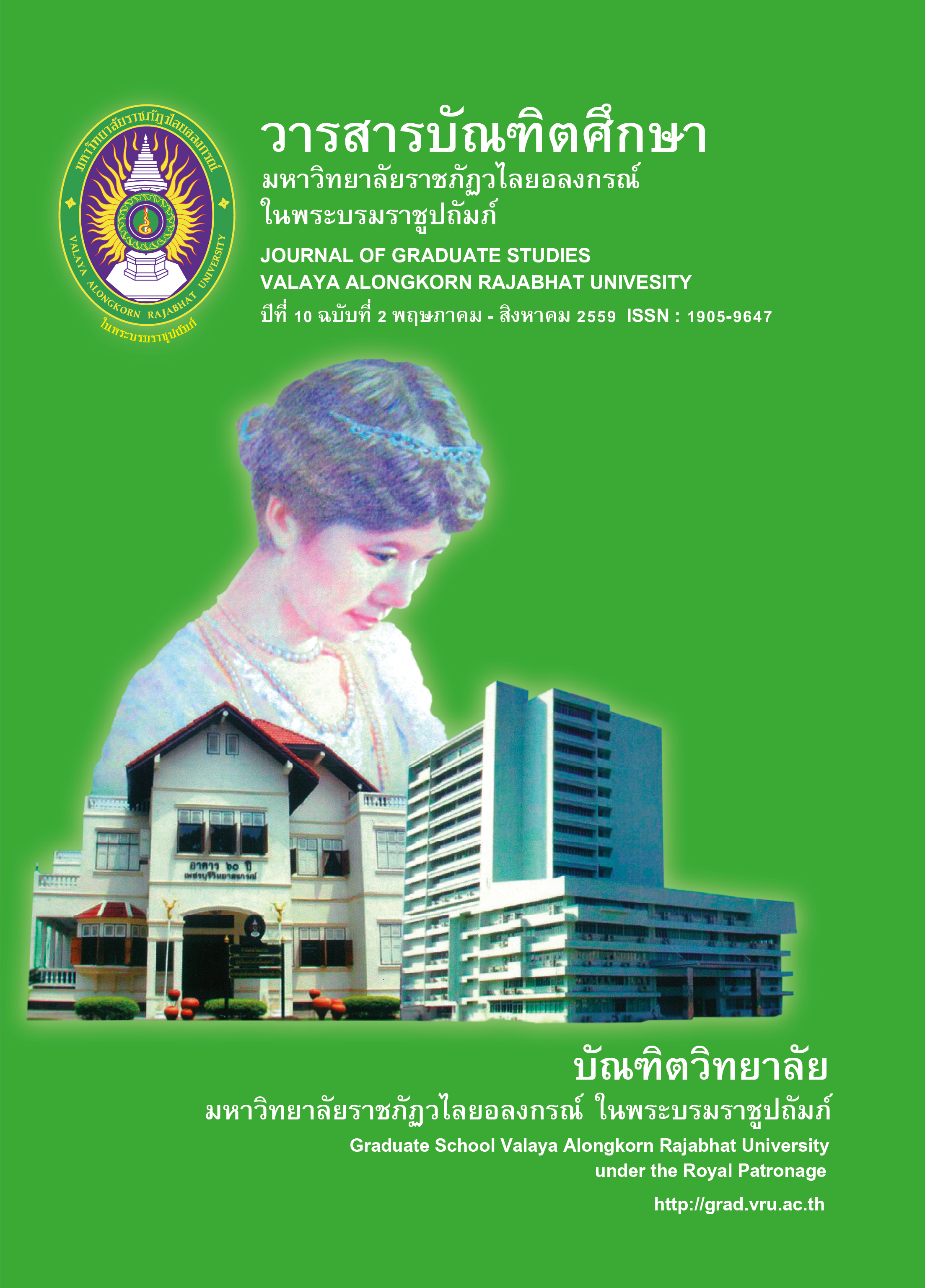ปัจจัยที่มีผลต่อการตัดสินใจศึกษาต่อระดับบัณฑิตศึกษาของนักศึกษาระดับบัณฑิตศึกษาคณะสิ่งแวดล้อมและทรัพยากรศาสตร์ มหาวิทยาลัยมหิดล
Main Article Content
Abstract
บทคัดย่อ
วัตถุประสงค์ของวิจัยนี้ เพื่อศึกษาปัจจัยและความสัมพันธ์ของปัจจัยที่มีผลต่อการตัดสินใจศึกษาต่อระดับบัณฑิตศึกษา กลุ่มตัวอย่าง คือ นักศึกษาระดับบัณฑิตศึกษา คณะสิ่งแวดล้อมและทรัพยากรศาสตร์ มหาวิทยาลัยมหิดลที่กำลังศึกษาในปีการศึกษา 2557 จำนวน 115 คน โดยใช้แบบสอบถามที่มีค่าความเชื่อมั่น 0.955 ได้รับแบบสอบถามกลับมาจำนวน 100 ฉบับ คิดเป็นร้อยละ 87 สถิติที่ใช้ในการวิเคราะห์ข้อมูล ได้แก่ ความถี่ ค่าร้อยละ ค่าเฉลี่ยเลขคณิต ส่วนเบี่ยงเบนมาตรฐาน การหาค่าสัมประสิทธิ์สหสัมพันธ์ด้วยวิธีของเพียร์สัน และไคสแควร
ผลการศึกษาพบว่า ปัจจัยโดยรวมมีผลต่อการตัดสินใจศึกษาต่อในระดับบัณฑิตศึกษาในระดับสูง (3.8 ± 0.56) การเรียงลำดับความสำคัญของปัจจัยที่ส่งผลต่อการตัดสินใจศึกษาต่อในระดับปริญญาโท เรียงลำดับค่าเฉลี่ยจากมากไปน้อยได้ดังนี้ ด้านคุณลักษณะสถาบัน (4.25 ± 0.51) ด้านการประกอบอาชีพ (3.95 ± 0.48) และด้านหลักสูตร (3.78 ± 0.57) ด้านสังคมและเศรษฐกิจ (3.22 ± 0.68) ผลการวิเคราะห์สหสัมพันธ์ด้วยวิธีของเพียร์สัน พบว่า ปัจจัยที่มีความสัมพันธ์กับปัจจัยด้านคุณลักษณะสถาบัน คือ ผลการเรียนสะสมในระดับปริญญาตรี โดยสัมพันธ์ไปในทางตรงข้ามระดับน้อย (r=-0.248) และรายได้ของบัณฑิต สัมพันธ์ไปในทางเดียวกันระดับปานกลาง (r=0.312) ปัจจัยที่มีความสัมพันธ์กับปัจจัยด้านหลักสูตร คือ รายได้ของบัณฑิต โดยสัมพันธ์ไปในทางเดียวกันระดับน้อย (r=0.252) และรายได้ของผู้ปกครองสัมพันธ์ไปในทางเดียวกันระดับน้อย (r=-0.293) ปัจจัยที่มีความสัมพันธ์กับภาพรวมของปัจจัยที่มีผลต่อการตัดสินใจศึกษาต่อ คือ รายได้ของผู้ปกครอง โดยสัมพันธ์ไปในทางเดียวกันระดับน้อย (r=0.267) ผลการวิเคราะห์ความสัมพันธ์แบบไคสแควร พบว่า อาชีพของกลุ่มตัวอย่างมีความสัมพันธ์กับปัจจัยด้านหลักสูตรและด้านสังคมและเศรษฐกิจ อย่างมีนัยสำคัญทางสถิติที่ระดับ 0.05 สาขาวิชาที่เรียนในระดับปริญญาตรีมีความสัมพันธ์กับปัจจัยด้านการประกอบอาชีพ อย่างมีนัยสำคัญทางสถิติที่ระดับ 0.05
ABSTRACT
The purposes of this research were to study factors and relationship between factors affecting students’ decision to enroll in post-graduation study. The research sample was post graduate students in the Faculty of Environment and Resource Studies at Mahidol University who were studying in the academic year 2014. The research tool was the questionnaire which was given to 115 students but there were only 100 respondents, totaling 87 percent. The statistics used for analyzing data composed of frequency, percentage, arithmetic mean, standard deviation, Pearson product moment correlation coefficient (r), and chi-square.
The results indicated that overall factors had strong effect on decision making to enroll in the graduate studies (3.8 ± 0.56). The factors affecting decision-making to study master’s degree, the respondents from high to low were the institutional image (4.25 ± 0.51), the future career (3.95 ± 0.48), the curriculum (3.78 ± 0.57), and the social and economic (3.22 ± 0.68). The results revealed that the factors related to the institutional image were the undergraduate cumulative GPA with weak negative relationship (r=-0.248), income with medium positive relationship (r=0.312). The factors related to curriculum were income with weak positive relationship (r=0.252) and the parents’ income with weak positive relationship (r=-0.293). The factor related to the overall of factors was the parents’ income with weak positive relationship (r=0.267). The results indicated that occupations of the samples had relationship with the curriculum and social and economic factors with a statistically significance difference at 0.05. The results revealed that major of undergraduate degrees had a relationship with the future career with a statistically significance difference at 0.05.
Article Details

This work is licensed under a Creative Commons Attribution-NonCommercial-NoDerivatives 4.0 International License.
บทความทุกเรื่องได้รับการตรวจความถูกต้องทางวิชาการโดยผู้ทรงคุณวุฒิ ทรรศนะและข้อคิดเห็นในบทความ Journal of Global of Perspectives in Humanities and Social Sciences (J-GPHSS) มิใช่เป็นทรรศนะและความคิดของผู้จัดทำจึงมิใช่ความรับผิดชอบของบัณฑิตวิทยาลัย มหาวิทยาลัยราชภัฏวไลยอลงกรณ์ ในพระบรมราชูปถัมภ์ กองบรรณาธิการไม่สงวนสิทธิ์การคัดลอก แต่ให้อ้างอิงแหล่งที่มา


